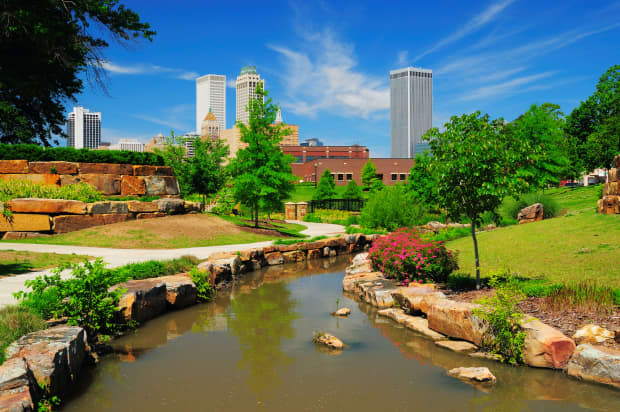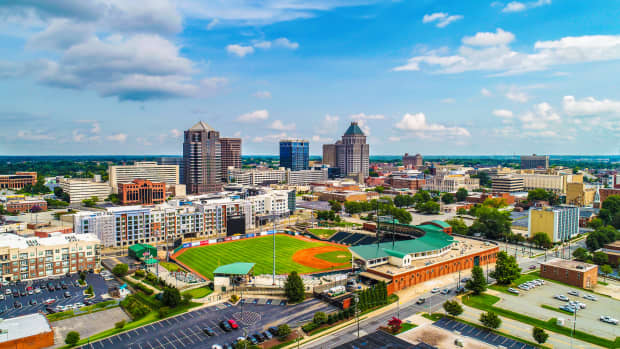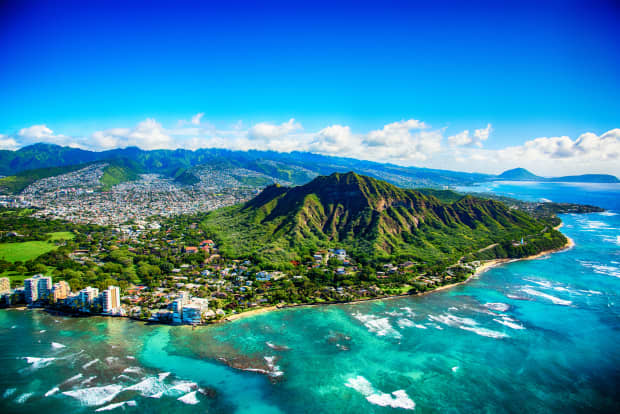This post was originally published on this site
If you’ve been considering making a move, you’re probably weighing a lot of different factors to make your decision: how close (or far) you want to be from family, your preferred climate, job opportunities, arts and food scene, etc.
Need a little nudge toward a specific place, or a little help getting there? Across the U.S., relocation programs are offering creative incentives and benefits to entice professionals to move or return to specific cities or regions. Here are a few incentive programs that have grabbed headlines recently — and might inspire you to make a move.
1. Tulsa Remote
Launched in late November 2018, Tulsa Remote requires its candidates to move to and live in this Oklahoma city for 12 consecutive months. They must stay within Tulsa’s city limits.
Upon applying, candidates must possess and keep full-time employment or be self-employed outside of Oklahoma and be eligible to work in the states. They also have to be 18 years of age or older.

Downtown Tulsa, Oklahoma
istock
Online application entries are submitted and reviewed by Tulsa Remote’s team members. Selected finalists then go on to a video interview.
Chosen participants get a $10,000 grant, a yearlong membership at 36 Degrees North, a co-working space, and community-building opportunities to get better acquainted with their new environment.
See: Where’s your best place to live? Ask yourself these questions to find out
As of April 2021, Tulsa Remote has welcomed more than 700 remote workers to Tulsa. More than 90% of the program’s members have stayed there past their one-year requirement.
Why Tulsa?
Find a ton of outdoor space in Tulsa, including The Gathering Place, a 100-acre riverfront park that Livability deemed the coolest park in the U.S.; the Tulsa Botanic Garden; Oxley Nature Center and Woodward Park. The live music scene is buzzing with outdoor/indoor venues ranging from Guthrie Green to The Colony. In 2021, Tulsa will welcome the opening of Greenwood Rising, a state-of-the-art history center honoring its Greenwood District, known as Black Wall Street, before and after the 1921 Race Massacre.
2. Remote Tucson
Established in late 2020, Remote Tucson awards chosen participants with a package of benefits and perks, including cash and services. It even helps them meet people and get connected in the community.
Chosen candidates have to move to Tucson within six months of being accepted and possess full-time remote employment or self-employment outside of Tucson and Pima County. They also have to be ages 18 and up and eligible to work in the U.S.
They are awarded an assistance package worth over $7,500. Broken down by category, approximately $1,500 will go to support relocation costs; a $500 co-working sampler pack to connect with co-working locations; a year of free gig internet valued at $1,500; career support services for a family member, spouse or partner at $700; and $1,000 in housing support.
Remote Tucson also sends in a welcome wagon to get new residents engaged in the community. Participants get paired with a Welcoming Committee member to help them get prepared to relocate to Tucson and even greet them when they arrive in town.
To further acquaint themselves with the city, participants receive a membership to one of Tucson’s arts or cultural organizations. One more thing: they get a six-month starter pass with Tucson Young Professionals.
Also see: We want to retire in a warm-weather lake town with lots of cultural offerings — where should we go?
Having started in winter 2020, approximately 600 applications came in from 39 states and three internationally. The pilot program accepted 10 participants, with 22 individuals with families.
Why Tucson?
Designated by Unesco as a 2015 “City of Gastronomy,” Tucson’s culinary background intertwines its Mexican and Native American heritages; try the Sonoran hot dog, a local favorite. Academically, Tucson has The University of Arizona and two-year schools, Brookline College, Pima Community College and Pima Medical Institute. Nature lovers don’t have to go far, with Tucson conveniently located between the west and east sides of Saguaro National Park, having Catalina State Park and the Tucson Urban Loop and other recreational trails.
Whether or not you take part in the official Remote Tucson program, this city is a great bet for remote workers: it was named one of Livability’s 10 Best Remote-Ready Cities earlier this year.
3. Life Works Here Talent Incentive Program, Northwest Arkansas
Also inaugurated in 2020, this program sponsored by the Northwest Arkansas Council is providing two major incentives for people to move to this part of the state.
The first is a $10,000 cash incentive. The second is the choice of either being gifted a street or mountain bicycle or an annual membership to one of the region’s arts and cultural institutions. The bicycle option ties into the opportunity to explore Northwest Arkansas on two wheels, including the 37-mile Razorback Regional Greenway.
While “Life Works Here” is open to candidates with different talents, the program is big on attracting STEAM (Science, Technology, Engineering, Art and Math) professionals and entrepreneurs. It also seeks those who will contribute to the vibrancy of the local community.
Also see: We want to retire to a small mountain town on $18,000 a year — where should we go?
To qualify, out-of-state candidates must be at least 24 years old and able to relocate to Northwest Arkansas within six months of being admitted to the program. They also have to have at least two years of work experience and buy a home or sign a lease for one.
Upon its late 2020 launch, “Life Works Here” received over 26,000 applications from candidates in more than 115 countries and all 50 states.
Why Northwest Arkansas?
In Northwest Arkansas, cyclists will have plenty of places to put their pedals to good use. Fayetteville has been designated a Bike City by the Union Cycliste Internationale, being the first in the U.S. to be awarded this label. As part of its Active Transportation Program, Fayetteville has many paved shared-use trails and natural-surface biking and hiking trails, plus a VeoRide bike share program. The same goes for the region’s Benton and Washington countries, which currently have approximately 484 miles of trails.
4. Boomerang Greensboro
Instead of looking for fresh faces to settle in Greensboro, this North Carolina-based relocation campaign focuses on former residents looking to move back to the city.

Greensboro, N.C.
istock
Established in November 2020, Boomerang Greensboro originated from a 2019 full-day retreat held by the nonprofit Action Greensboro. Participants, which ranged from community and business leaders to young professionals, talked about how Greensboro could encourage a number of professionals to move back there annually, and Boomerang Greensboro was born.
Also see: These 13 cities, states, and countries will pay you to move there
Differing from other programs, the Boomerang Greensboro doesn’t provide monetary incentives. However, it offers concierge services to help relocators find a job, home, school and other necessities of day-to-day life — as in, fellow Greensboro residents who have volunteered to welcome boomerangers back to the area.
Available through the program, Greensboro Gurus is a group of locals who can advise on the ins and outs of city living once the program’s participants move back into Greensboro. These gurus can speak about specific topics and interests and can be contacted through the program’s website.
Their areas of knowledge encompass African-American networks, colleges and universities, dining and hot spots, LGBT resources; small business opportunities; shopping; and women’s resources, among other subjects. Also, on the program’s website, viewers can read up on profiles on other participating Boomerangs.
Why Greensboro?
Greensboro is home to 12 unique golfing opportunities, from courses to clubs. Black art, culture and history in Greensboro are preserved and celebrated through places such as the International Civil Rights Center and Museum, where the famous 1960 sit-in occurred, to Historic Magnolia House, a former Green Book lodging site turned into an event center.
5. Movers & Shakas, Hawaii
This temporary relocation program happening in the 50th U.S. state will not have participants merely spending their remote work days on the beach. They will also be required to give their time and expertise toward benefiting their new community.

Hawaii, anyone?
istock
Started in December 2020 by the Hawaii Executive Collaborative, Movers & Shakas is open to former Hawaii residents and out-of-staters. They must be U.S. domestic workers, ages 18 and up, already employed and able to retain their position when relocating to Hawaii.
Participants must commit to applying their professional knowledge and connections toward fostering local job growth and youth-related career development programs.
They will partake in cultural education measures, mentor local startups, connect with their professional surroundings, bond with their cohorts and spend 15-plus hours volunteering with local nonprofits and advising startups. They also will be flown to Hawaii at no cost and provided with discounted hotel stays and services.
See: These WFH tech employees moved to another state and kept the same job
Out of 90,000 applicants, the first cohort of Movers & Shakas was launched in Oahu with 50 chosen participants that began February 2021. The program is planned to be continued on a rolling basis; the application process for the second round is expected to take place later that year.
Why Hawaii?
Besides the obvious (natural beauty, stunning beaches, welcoming culture, perfect weather, etc.), Hawaii is a great place to live for many reasons and many lifestyles. Speaking specifically of Oahu, the island has five distinct regions — Honolulu, the Windward Coast, Central Oahu, the Leeward Coast and the North Shore. Farmers markets are common and sell locally-grown and produced foods. Oahu’s North Shore beaches are the location for premier surfing competitions, while Honolulu is the epicenter of Hawaii’s art scene.
Read the original article on Livability.


